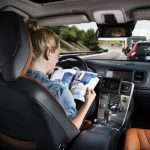 As driverless technology has progressed, the trolley dilemma has been an ongoing source of consternation. What was once an ethical dilemma posed to philosophy students has become a very real problem for an industry grappling with how vehicles should react in emergency situations.
As driverless technology has progressed, the trolley dilemma has been an ongoing source of consternation. What was once an ethical dilemma posed to philosophy students has become a very real problem for an industry grappling with how vehicles should react in emergency situations.
The latest study into this problem attempts to overcome it by asking the public what they believe is the most ethical response to certain emergency situations on the road. The research, which was led by researchers from the Max Planck Institute for Human Development, asked volunteers to choose between staying in their lane and braking or swerving to try and avoid collisions with another road user in varying degrees of severity and uncertainty.
Emergency stop
By far the most popular option chosen by the volunteers was to perform an emergency stop, which the researchers believes conforms to the view that this option provides better controllability, even if its chances of reducing injury are lower than swerving. It’s an option that requires less processing of information, and therefore might deliver better outcomes purely because it can be performed faster. What’s more, if the volunteers were told that braking would still result in an accident, they persisted with it, whereas they changed tact when told the same about swerving.
The study is interesting because it also explores how we tend to evaluate the behavior of autonomous vehicles after an incident has occurred. A fresh pool of several hundred volunteers was recruited and asked how the AV should perform in specific situations. The results show that if the vehicle remained in its lane, there was no difference in how people perceived it. It was doing the right thing, and the outcome was incidental. If the vehicle swerved however, people were highly likely to view the actions as reckless if injuries resulted.
“Our research highlights the importance of gaining a better understanding of how people think about the behavior of autonomous vehicles under different degrees of uncertainty,” the authors say. “The findings will help to inform policy making and public discussion of the ethical implications of technological advances that will transform society in a variety of ways.”
If nothing else, it highlights the slightly irrational way we tend to view road safety, and that this irrationality is something that developers need to keep in mind when devising the safety procedures for autonomous vehicles. Likewise, policy makers also face this challenge when creating policies that are morally sound whilst also appealing to public perceptions of safe behavior. At the moment, it’s likely that there is divergence between the apparent public acceptance of a default action, and the AV owners preference for whatever action saves the likes of the vehicle’s passengers.